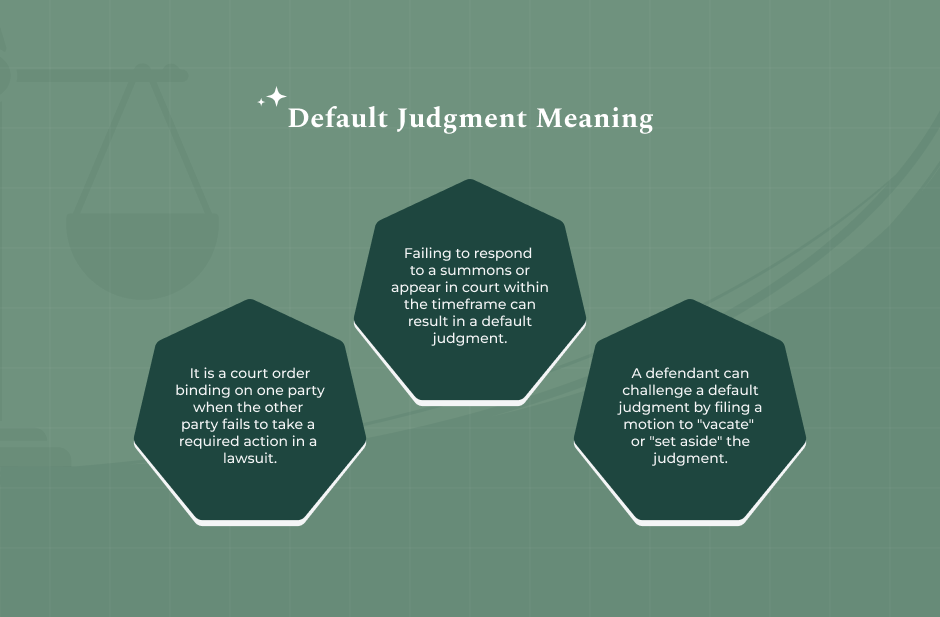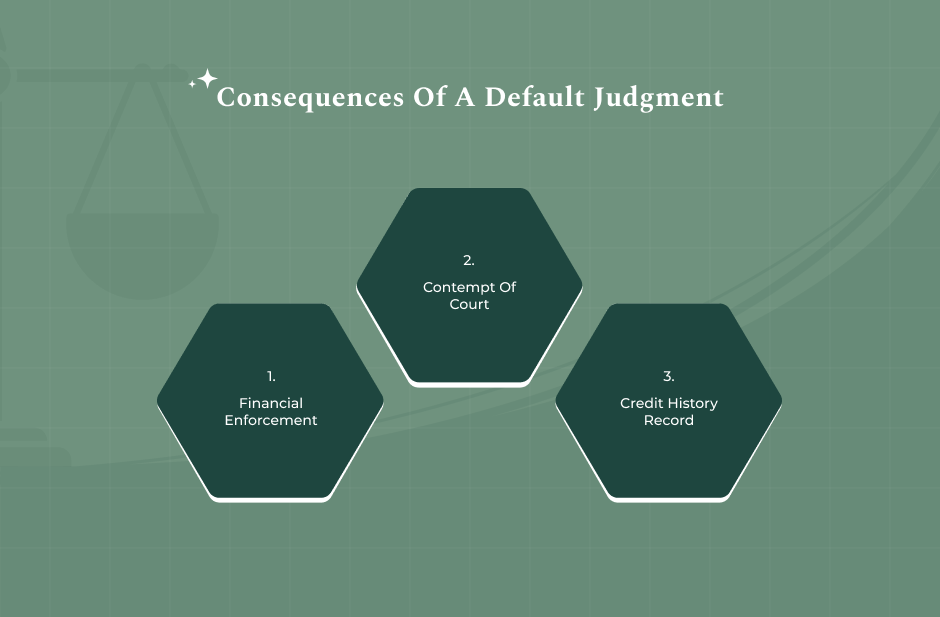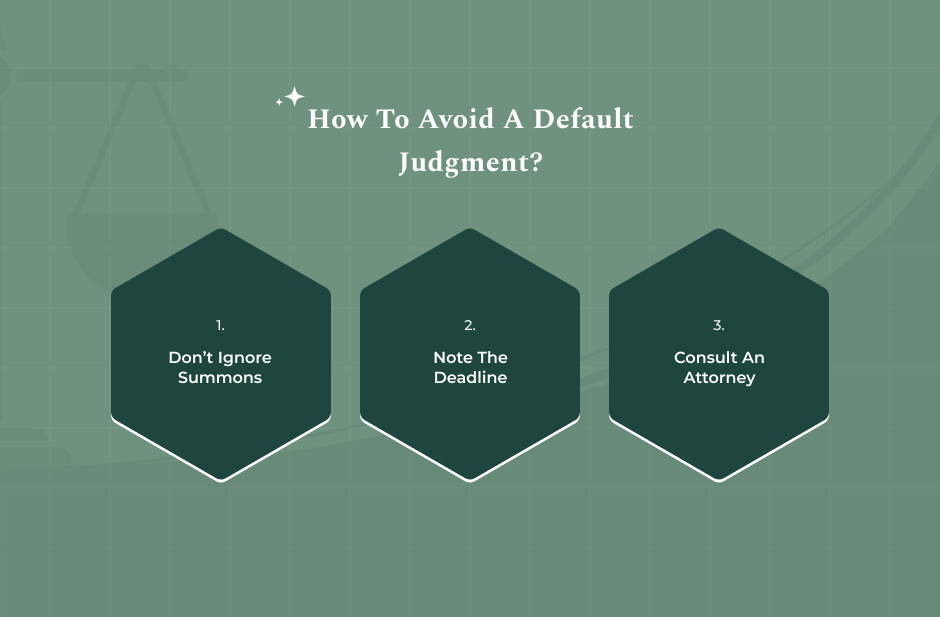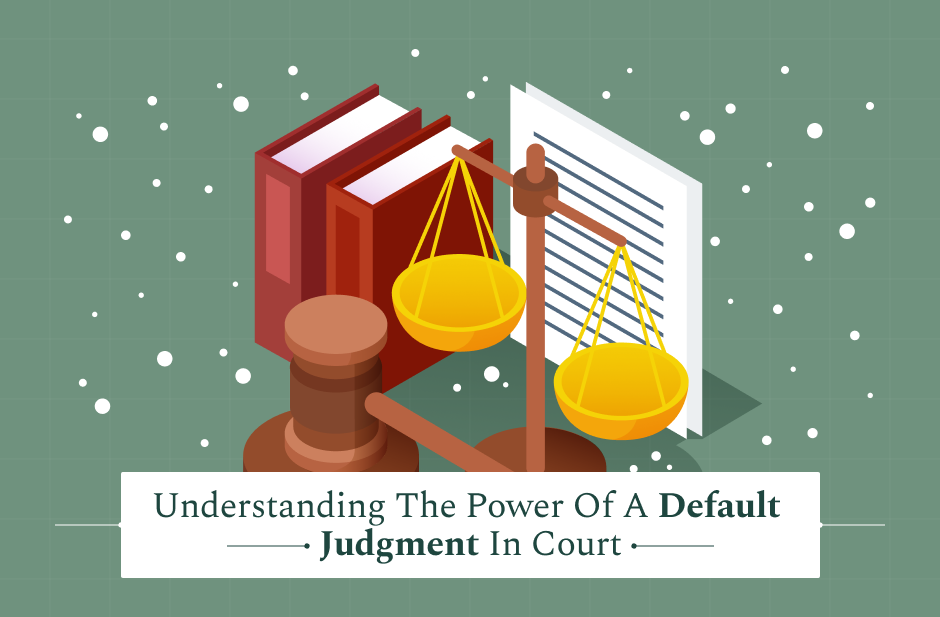The most serious event that can occur in any case is the entry of a default judgment. To the plaintiff, it means instant victory. To the defendant, it means the loss of all without ever having had his day in court.
The aim of this guide is to take you through the complicated rules associated with default judgment. We are going to look at what it is, how courts grant it, what the consequences of a default judgment are, and how to fight back from it.
Here, we try to provide you with full information on a default judgment.
What Is A Default Judgment And Why Does It Happen?

A default judgment is a form of punishment against a party for not taking part in the suit.
The Basic Default Judgment Meaning
Default judgment means exactly what it sounds like: A court enters a binding decision for one party, the plaintiff, because the other party, the defendant, failed to do what the rules require.
In most cases, a defendant is formally served with a summons and complaint. These documents provide notice to the defendant of what the plaintiff is claiming and how much time the defendant has to respond.
If the defendant misses this strict deadline, then the court can enter a default judgment against them.
Why Do Courts Allow Default Judgment?
The courts expect everyone to meet deadlines. If the defendant has utterly ignored the filing of a lawsuit, the court system doesn’t work. The power of default judgment is something that ensures timeliness, as opposed to having defendants delay indefinitely.
A default judgment will usually occur for:
- The defendant failed or omitted to file any response to the summons and complaint served upon them.
- The defendant did not timely file an “Answer” or other responsive pleading.
- Defendant filed a response but then failed to appear at a required court appearance.
Steps By Plaintiff For Default Judgment
This does not mean that a default by the defendant will entail automatic winning of the case by the plaintiff. The plaintiff must still go before the court formally for a default judgment. This process has generally two major steps.
1. Entry Of Default
First, the plaintiff files a request asking the court clerk to enter an “Entry of Default.” That document officially records that the defendant missed the deadline. For the most part, this is just an administrative act of the court clerk, and not a judge.
The entry of default does not yet finalize the case, but it locks the defendant out of the process until the default is addressed.
2. Filing The Motion For Default Judgment
Once the clerk has entered the default, the plaintiff takes the final and critical step: they move for default judgment.
What Is A Motion For Default Judgment?
It is the formal request that a plaintiff makes to the judge. The plaintiff asks the judge to convert the entry of default into a final, binding judgment.
In moving for default judgment, the plaintiff should file the following with the court:
1. Proof Of Service
Documents showing that the defendant was properly and legally served with the original complaint.
2. Affidavit Of Default
This is an affidavit confirming that the defendant has not responded, and such time has expired.
3. Damages
These are evidence or calculations showing precisely the amount the defendant owes. In a simple matter seeking a specific sum of money, such as a credit card debt, the clerk of the court can enter the final default judgment.
- Where there is physical injury to a person.
- Unliquidated damages, that is, an amount of money which has not been fixed.
- The judge must hold a hearing to determine the final amount of the default judgment.
What Are The Consequences Of A Default Judgment?

A default judgment has serious and swift consequences against the defendant.
If the court enters a default judgment against you, you immediately forfeit the right to defend against the claims that form the basis of the lawsuit. Hence, the court takes all allegations in the plaintiff’s complaint as true.
The defendant may be sentenced to:
1. Financial Enforcement
Now the plaintiff legally can collect the money awarded. This could be in the form of wage garnishment-the money taken directly from the paychecks. Freezing bank accounts, or placing property liens-a claim against real estate.
2. Credit Damage
Although the default judgment does not affect your credit score, it is a public record. Thus, it will always appear in any kind of background check, influencing future opportunities with regard to loans or housing.
3. Finality And Collection For The Plaintiff
Legal finality, for one thing, immediately takes place with the issuance of a default judgment in favor of the plaintiff. No longer would the plaintiff have to take any more unduly burdensome steps, such as expensive discovery or a long, arduous trial.
Now, he has quite a powerful court order to begin collection proceedings immediately. This is one major reason why filing a motion for default judgment is a key strategic move for so many plaintiffs.
Fighting Back: Setting Aside A Default Judgment
Getting a default judgment is by no means the end of the line. The defendant may ask the court to “set aside” or “vacate” the default judgment.
The defendant will have to file a motion to the court requesting that the case be reopened in order to contest a default judgment. The court will have to find an excellent reason to vacate the judgment-usually one of the following:
1. Improper Service Or Lack Of Notice
The most powerful argument against a default judgment is to prove you never legally received notice of the lawsuit. If the plaintiff served the wrong person, or if they failed to follow the rules for proper service, the court could declare the entire default judgment void.
2. Excusable Neglect
This is the most common and difficult argument. Excusable neglect means you missed the deadline due to an honest mistake, accident, or circumstances beyond your control such as a serious illness, family emergency, or office error.
The court then will weigh the reason for the delay against the harm that it causes the plaintiff. The defendant also must show the court in a timely manner that they have a valid “meritorious defense” to the original claim.
Is A Default Judgment A Final Judgment?
Yes, a default judgment is a final judgment. This means that it’s an order of the court which concludes the case, and with which the plaintiff is immediately able to begin enforcement. However, it is only final provided the court does not vacate it.
If the court grants your motion to set aside the default judgment, the case is reopened. If you fail in your motion, the judgment remains final and may be enforced. Since a default judgment is a final judgment, you must take action as soon as you learn of the judgment if you want to challenge it.
Read Also: What Is A Calendar Call In Court? Essential Guide For Litigants
Best Practices To Avoid A Default Judgment

It is always easier to avoid a default judgment than to fight one. Take these tips to protect yourself and your business:
Best Practices To Avoid For Defendants (Prevention)
- Never Ignore The Mail: Take all legal documents seriously and as urgent. In no circumstance assume that because you are ignoring it, the case will ever go away.
- Mark The Deadline: Once you have received the summons, calculate the date your response is due, then mark it conspicuously.
- Hire Counsel Immediately: The very moment that the complaint comes in, hire a lawyer. Most of the time, a lawyer can buy extra time by getting a short extension from the plaintiff.
Best Practices To Avoid For Plaintiffs (Procedure)
- Perfect Service: Serve the papers with absolute conformity to the rules of service. The surest way for the defendant to set aside your default judgment is by proving defective service.
- Document Everything: Keep perfect records concerning court filings, deadlines, and attempts at service. It strengthens the eventual motion for default judgment.
- Be Patient: Do not file your initial request for default until the response period is fully complete.
A default judgment is a high-stakes moment in any litigation, offering an extreme advantage to the prevailing party. How to properly procure or effectively contest a default judgment requires knowing the rules and acting fast.
Frequently Asked Questions (FAQs):
If you are facing a default judgment, seek local legal advice immediately.
Yes, the court may still enter default against you even if you filed a response. If it requires that you appear for a scheduling conference, mediation, or trial, and you fail to appear, the court may sanction you including entering default against you in favor of the plaintiff.
The point is, you have to keep going back until your case is formally closed.
You must move with as much expedition as possible. Courts frequently impose a requirement that you file your motion to set aside default judgment within a “reasonable time.”
That time is defined variably by jurisdiction, but several months can elapse without good cause. In this case even if you have a good reason, the judge can still deny your motion simply because your delay prejudices the plaintiff.
Not necessarily. Let’s say that the plaintiff’s claim was for what is termed a “sum certain” such as $5,000 for breach of contract. Then, in those instances the court will usually grant the default judgment in the amount requested.
In case a plaintiff sought damages for an unspecified amount, pain and suffering due to an accident, then the judge is likely to have to hold a brief hearing in order to determine the final. fair amount of money before the default judgment is issued.

















